Physical Address
304 North Cardinal St.
Dorchester Center, MA 02124
Physical Address
304 North Cardinal St.
Dorchester Center, MA 02124

Are you interested in pursuing a career in Cyber Security? With the growing demand for professionals in the field, more and more universities are offering online programs to help students achieve their goals. But with so many options available, how do you know which program is right for you?
In this blog, we will be discussing everything you need to know about Cyber Security Degree Online Programs. From what they are and why you should pursue one to a comparison of online vs on-campus programs and the top 10 programs available for 2023.
We will also delve into the coursework, accreditation, certifications, semesters and credits, and even different roles in the industry. Whether you’re a seasoned professional or new to the field, this blog has got all your questions covered.
BEST CYBER SECURITY DEGREE
Certifications:
MasterClass:
JobAssist:
A Cyber Security Degree Online Program is an educational program that equips students with the skills and knowledge needed for cybersecurity careers.
It covers topics like cryptography, network security, and ethical hacking. The online format offers flexibility for working professionals. Upon completion, graduates can access diverse job opportunities in the field.

An online Cyber Security Degree provides the convenience of flexible schedules and a diverse range of courses and specializations. As the field of cybersecurity continues to grow, pursuing an online degree can lead to lucrative career opportunities in high demand.
The decision to pursue a Cyber Security Degree program in an on-campus or online environment is a crucial one. While online programs offer flexibility and affordability, on-campus programs provide face-to-face interactions with professors and access to better resources such as laboratories and research facilities.
To make the right decision, individuals must consider their preferences, lifestyle, and career goals carefully. It is essential to look into factors such as information technology, information security, financial aid, bachelor’s degree program admission requirements, accreditation of the program by organizations like NSA or Higher Learning Commission (HLC), transfer credits available, and number of credit hours per semester for the program.
Read More: Best Cyber Security Degree: Certificate from MIT
Are you interested in pursuing a cyber security degree online program? When looking for the best cyber security degree online programs for 2023, there are a few important factors to consider.
It’s crucial to select an accredited program that meets industry standards, has a good reputation, offers courses aligned with your interests and goals, and provides hands-on experience through internships or practical assignments.
Additionally, evaluate the flexibility of each program based on whether it offers online vs. on-campus options and part-time vs. full-time enrollment. Other important aspects include transfer credits, admission requirements, financial aid availability, and accreditation.
With careful consideration of these factors, you can select an excellent cybersecurity bachelor’s degree program that sets you up for success in this growing field.
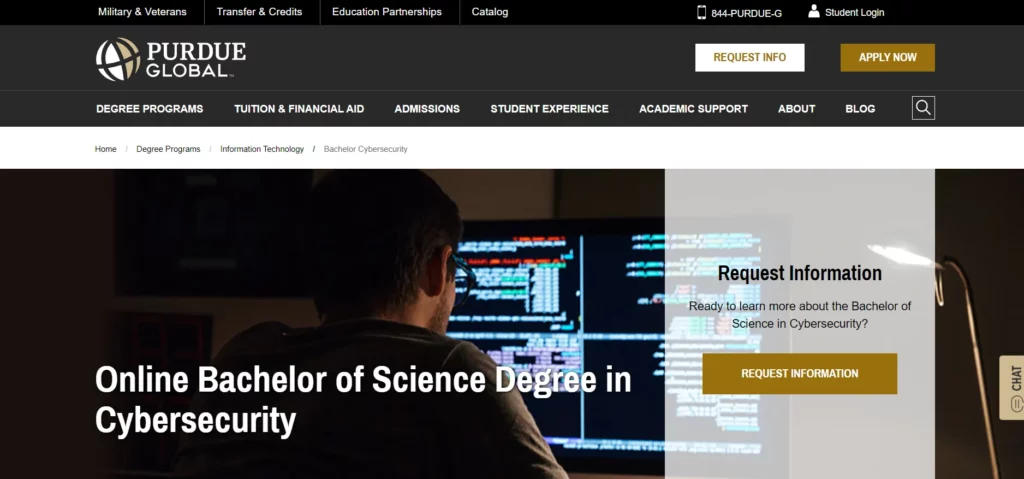
Purdue University Global’s online cybersecurity degree program prepares students for careers securing computer networks. Accredited by the Higher Learning Commission and recognized by industry leaders like Cisco and Microsoft, it covers topics like network security, digital forensics, cryptography, and risk management.
Students gain practical experience through virtual labs and hands-on projects. To be admitted, you need a high school diploma or equivalent; transfer credits are accepted. With employment of information security analysts projected to grow 33% according to the Bureau of Labor Statistics (BLS), earning certification from organizations such as CompTIA can increase your earning potential as a cybersecurity professional.

At Liberty University’s online cybersecurity degree program, you can pursue a Bachelor of Science or Master of Science degree that will prepare you for defending against cyber threats. The coursework covers various relevant topics such as network security, cryptography, ethical hacking, and digital forensics.
The courses are designed to provide students with the necessary technical skills to become successful cybersecurity professionals. With easy access to academic advisors, career services support and technical assistance for online students too is provided which makes it an even better option for higher education in cybersecurity.
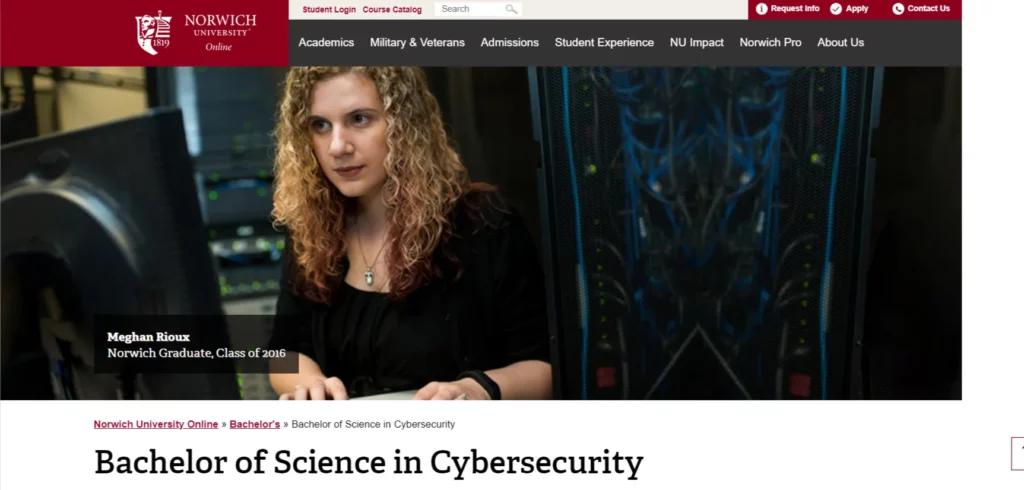
The Master of Science in Information Security and Assurance at Norwich University prepares cybersecurity professionals to secure information systems from cyber threats using best practices in network security, cryptography, and digital forensics.
The program is fully online with admission requirements that emphasize critical thinking skills. Enroll now to learn from experts in the field and join the workforce securing our nation’s financial aid management systems. Transfer credits are available for those who qualify.
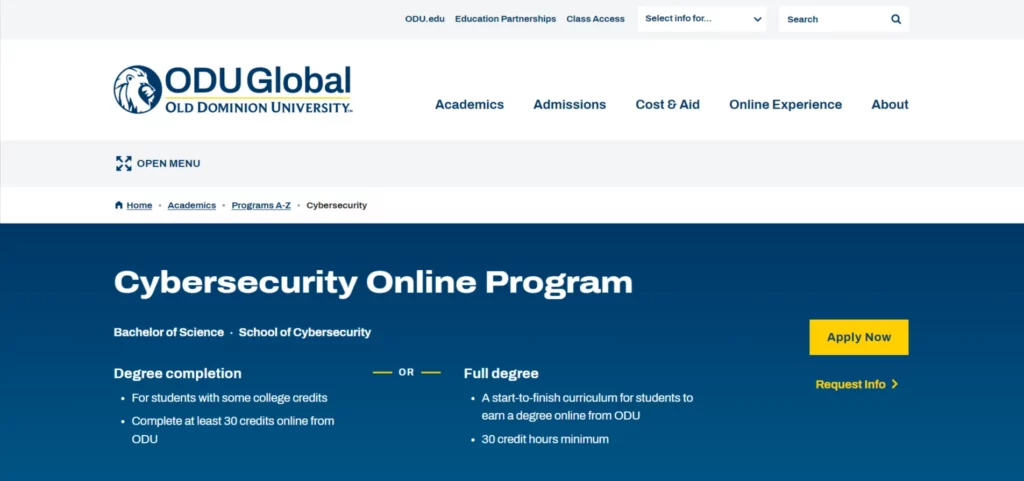
Old Dominion University’s online Bachelor of Science in Cybersecurity degree program offers students a rigorous curriculum that covers computer networks, cryptography, cyber law, and policy while providing real-world experience through virtual labs and projects.
Graduates are fully equipped with the technical skills necessary for careers in cybersecurity or higher education in the field. As a recognized National Center of Academic Excellence by both the NSA and DHS for its exceptional cybersecurity education program, Old Dominion University set its students up for success in one of today’s fastest-growing industries.

The Bachelor of Science in Cybersecurity degree program offered by Grand Canyon University has gained popularity among online students seeking information technology degrees. With a curriculum that covers various aspects like network security, ethical hacking, digital forensics, and more; students get hands-on experience through modern labs equipped with state-of-the-art software development tools.
Graduates are prepared for cybersecurity careers with an emphasis on earning industry certifications like CompTIA Security+ and Certified Information Systems Security Professional (CISSP). The institution also provides helpful resources like career services and networking opportunities that enable cybersecurity professionals to stay up-to-date with best practices.
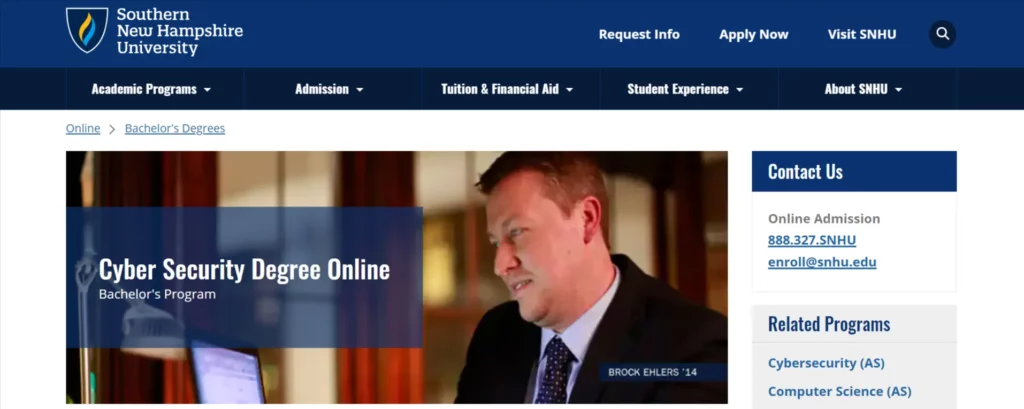
With its varied range of online cybersecurity programs, Southern New Hampshire University provides an excellent platform for higher education in cybersecurity. These programs cover various topics including network security, cryptography, cybercrime investigation, and information technology.
They are designed with a curriculum that fosters critical thinking and best practices in the field. Furthermore, the university’s experienced faculty and industry experts offer mentorship to students who enroll in these online cybersecurity degree programs.
With flexible enrollment options like transfer credits and online courses available, Southern New Hampshire University is an ideal choice for those seeking a career in information security analysis or related fields.
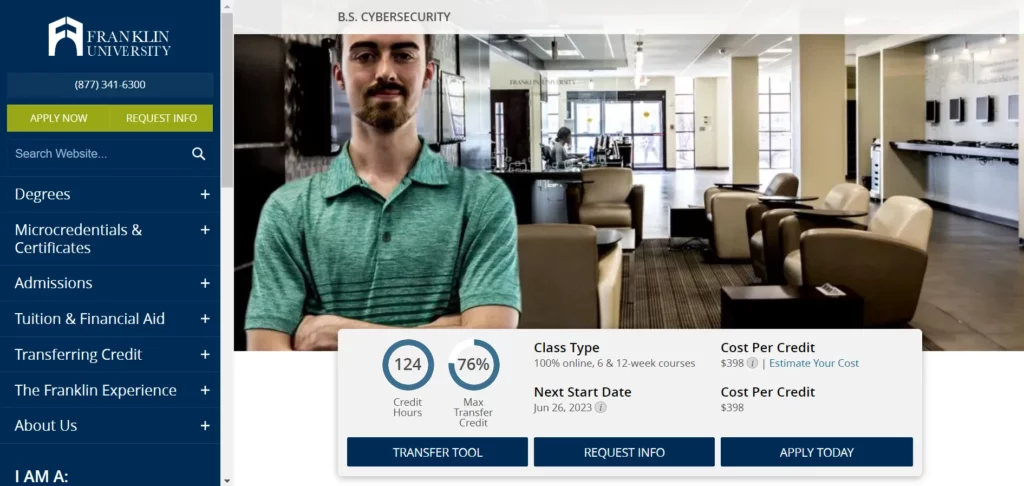
Franklin University’s cyber security degree program prepares students for careers in network security, digital forensics, information technology, and other related fields. The coursework includes topics such as risk management, homeland security, cryptography, malware, incident response, algorithms, and database management.
The degree program is accredited by the Higher Learning Commission and certification credentials are included in the curriculum. Transfer credits are available for eligible candidates.

Maryville University’s online cybersecurity degree programs are designed to provide students with the technical skills and critical thinking abilities required for securing computer systems.
As a National Center of Academic Excellence in Cyber Defense Education recognized by the NSA and DHS, the university offers virtual labs, simulation exercises, and real-world case studies to enhance the learning experience. With coursework covering network security, cyber law and policy, digital forensics, and more; Maryville University is among the best options for higher education in cybersecurity.

Mercy College offers a comprehensive Bachelor of Science in Cybersecurity degree program that prepares graduates for prominent cybersecurity analyst, security engineer, and information security management roles. The coursework includes topics such as network security, ethical hacking, digital forensics, and cyber law.
Virtual labs are available to provide students with hands-on experience and the opportunity to hone their technical skills. Mercy College provides career counseling, and networking opportunities for its online students along with transferable credit hours which is an added advantage for students seeking higher education in this field.
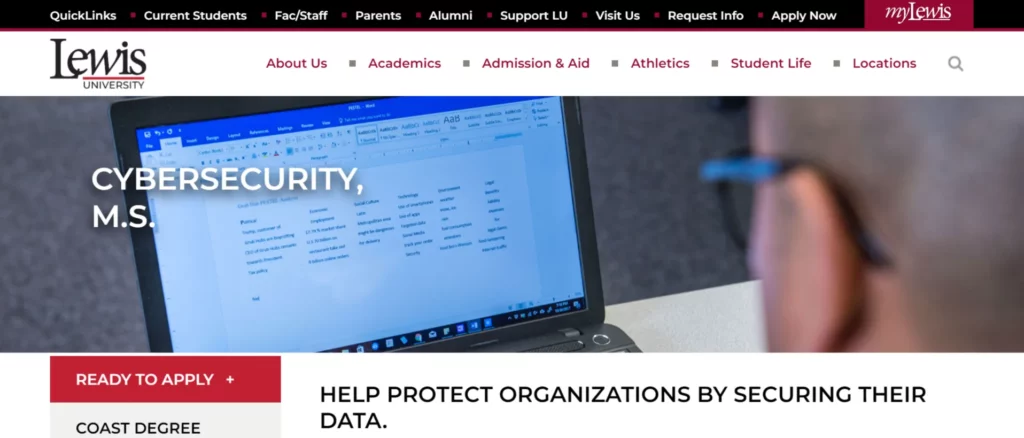
Lewis University’s online Master’s Degree in Cyber Security program provides a comprehensive understanding of cybersecurity principles and practices in areas such as cyber law, digital forensics, and network security. This interdisciplinary program prepares students for leadership roles through regular curriculum updates to keep them current with emerging trends.
Accessible mentorship from experienced faculty members and industry experts enhances the learning experience, while hands-on experience is available through internships and capstone projects. Lewis University’s Cybersecurity degree program is accredited by HLC and NSA-CAE and offers transfer credits, financial aid options, certificates, and diplomas upon completion, among other benefits.
When planning to enroll in a Cybersecurity Bachelor’s Degree Online Program, it is crucial to ensure that you opt for an accredited program with a comprehensive curriculum. This curriculum must cover various cybersecurity topics such as network security, digital forensics & ethical hacking.
Additionally, check for accreditations from organizations like NSA or higher learning commission. It is advised that you research the faculty’s qualifications & experience in the field to make sure they are up-to-date with best practices & critical thinking abilities. Lastly, make sure your degree program has enough flexibility to accommodate your transfer credits or semester requirements.
Aspiring cybersecurity professionals can gain expertise in various areas with the coursework offered in a cyber security bachelor’s degree program online. This program covers a comprehensive range of topics including network security, cryptography, ethical hacking, and digital forensics.
In addition to these technical skills like risk management along with cybersecurity policies and regulations and incident response planning are also taught in-depth. To provide practical exposure to students many online cybersecurity degree programs offer hands-on experience via internships or virtual labs which is beneficial while securing employment post-graduation.
Graduates of this program can pursue careers as information security analysts or specialize further in fields like cyber defense or network security engineering.
The duration of an online cybersecurity bachelor’s degree program varies by school and program. On average, it takes 4 years, but accelerated options may reduce the time to 2-3 years. The program length may also depend on full-time or part-time enrollment and transfer credits. Check program details when choosing a course.

Choosing an accredited cyber security bachelor’s degree program online should be a top priority to ensure quality education and better job prospects.
Accreditation by ABET or CAE verifies the credibility of the degree. Graduates learn about risk management, cybersecurity policies and regulations, incident response planning, network security engineering, and information security analysis.
It is vital to research online cybersecurity programs’ accreditation requirements before enrolling because they impact transfer credits that may affect one’s enrollment status in the future.
As the demand for cybersecurity professionals continues to rise with increasingly sophisticated cyber threats globally, pursuing a bachelor’s degree program in cybersecurity is an excellent way to secure a bright future in Information Technology (IT).
The best practices of information assurance, risk management, digital forensics, and incident response are instilled within such programs. These online cybersecurity degree programs adhere to accreditation from independent organizations like ABET and NSA to ensure curriculum quality.
Pursuing these degrees can lead to ample employment opportunities as an information security analyst with median annual earnings of $103,590 (Bureau of Labor Statistics).
Cybersecurity professionals who pursue a cyber security degree online program often have the opportunity to earn third-party cybersecurity certifications that boost their resumes. Certifications such as the CompTIA Security+, Certified Information Systems Security Professional (CISSP), and Certified Ethical Hacker (CEH) can demonstrate a high level of knowledge and expertise in the field of cybersecurity.
Cybersecurity degree programs may include these third-party certification courses as part of their curriculum, adding value to the degree. When selecting an online cybersecurity degree program, it’s essential to consider available third-party certifications and how they align with your career objectives.
This strategic approach is crucial in pursuing higher learning commission-accredited online programs with transfer credits, financial aid, accreditation, and admission requirements without starting with “Cybersecurity Degree Online.”

Earning cyber security certification showcases your dedication and proficiency, increasing competitiveness in the job market. Employers often require or prefer candidates with certifications like CompTIA Security+ and CISSP, leading to higher salaries and career advancement.
Keeping up-to-date with the latest tech and threats is crucial. Certification, along with ongoing education, sets you apart and makes you a valuable asset to any organization.
When enrolling in an online cybersecurity degree program, make sure to research flexible course options that can accommodate your schedule and learning style. Choose a program that has accreditation from reputable organizations like the Higher Learning Commission or National Security Agency.
Ensure that you have a good understanding of credit requirements, transfer credits, and enrollment procedures before beginning coursework. This will ensure you gain technical skills in information technology, network security, cryptography, incident response, data breaches, malware, digital forensics, algorithms, database management, and software development and qualify for admission requirements for bachelor’s degree programs in business administration or computer science.
The duration of a cyber security semester can differ depending on the school and program. Typically, it follows a traditional 15-16 week schedule, but some programs may offer shorter intensive semesters or flexible online schedules. It’s crucial to choose a program that suits your learning style and schedule preferences.
The number of credits needed for an online cybersecurity degree can differ by school but usually range from 120 to 130. Some programs may offer accelerated options and credit for past experience. It’s crucial to assess the credit distribution throughout various courses, including network security, cryptography, and ethical hacking, to prepare for a career in cyber security.

Cybersecurity professionals have distinct roles in the industry—ethical hacking plays an important part in preventing cyber-attacks while white-hat professionals secure computer networks from data breaches. Technical skills like algorithms, cryptography, and incident response are necessary for becoming a white-hat professional while hackers require critical thinking and software development skills.
Pursuing a degree program in cybersecurity equips students with knowledge of information security analyst roles, financial aid options such as transfer credits, and work-study programs offered by colleges and universities accredited by higher learning commissions like NSA or BLS. Network security, information assurance, risk management, and digital forensics are some of the topics covered in this course.
Hackers play a significant role in the cybersecurity industry, with their intentions and ethics defining their roles. Black hat hackers exploit system vulnerabilities for personal gain or malicious purposes, while white hat hackers identify and fix security flaws to prevent cyber attacks.
Grey hat hackers use their skills for both good and bad purposes. Understanding these distinctions is crucial in combating cyber threats effectively.
White-hat hackers are ethical professionals who use their hacking skills for good by identifying and fixing vulnerabilities in systems. Their demand is increasing as more organizations invest in cybersecurity.
A degree in cyber security can equip one with the necessary knowledge and skills, but problem-solving abilities and a strong understanding of tools and principles are also vital.
These schools offer various specializations in cybersecurity, including network security, cyber operations, and digital forensics. Each program has unique curriculum requirements, so it’s essential to research and compare them before making a decision.
| No. | University | Description |
| 1. | University of Maryland Global Campus | Offers an online Bachelor’s in Cybersecurity with a focus on practical skills and industry certifications. |
| 2. | Western Governors University | Provides an online program aligned with industry-recognized certifications in Cybersecurity and Information Assurance. |
| 3. | Arizona State University | Offers an online Bachelor of Science in Cybersecurity degree with a curriculum focused on industry concepts and skills. |
| 4. | Bellevue University | Provides an online Bachelor’s in Cybersecurity program emphasizing hands-on experience and real-world scenarios. |
| 5. | Dakota State University | Offers an online program in Cyber Operations to develop skills in network security, digital forensics, and offensive security. |
| 6. | Champlain College | Provides an online Bachelor’s degree in Cybersecurity with specialized tracks and industry-relevant coursework. |
| 7. | Capitol Technology University | Offers an online Bachelor of Science in Cybersecurity with options to specialize in Network Security or Digital Forensics. |
| 8. | Colorado State University Global | Provides an online Bachelor’s in Cybersecurity covering topics like cyber defense, risk management, and digital forensics. |
| 9. | Davenport University | Offers an online Bachelor of Science in Cybersecurity with specializations in Ethical Hacking and Digital Forensics. |
| 10. | DeSales University | Provides an online program combining technical knowledge with business and management skills in Cybersecurity. |
| 11. | ECPI University | Offers an online Bachelor’s degree in Cyber and Network Security focused on hands-on training and industry partnerships. |
| 12. | Excelsior College | Provides an online Bachelor of Science in Cybersecurity aligned with industry standards and best practices. |
| 13. | Fort Hays State University | Offers an online Bachelor’s in Information Networking and Telecommunications with a Cybersecurity track. |
| 14. | Hodges University | Provides an online Bachelor’s in Cybersecurity program with a multidisciplinary approach to security and privacy. |
| 15. | Jacksonville State University | Offers an online Bachelor of Science in Cybersecurity covering key aspects of information security. |
| 16. | Kennesaw State University | Provides an online Bachelor of Science in Cybersecurity degree emphasizing hands-on experience and practical skills. |
| 17. | Lamar University | Offers an online Bachelor of Science in Industrial Technology with a concentration in Cybersecurity. |
| 18. | Marist College | Provides an online Bachelor’s in Information Technology with a Cybersecurity concentration, preparing students for cybersecurity careers. |
| 19. | Mercyhurst University | Offers an online Bachelor of Science in Cyber Risk Management combining cybersecurity, business, and risk management skills. |
| 20. | Metropolitan State University | Provides an online Bachelor’s degree in Cybersecurity focused on technology, management, and policy aspects. |
| 21. | National University | Offers an online Bachelor’s in Cybersecurity and Information Assurance program designed to meet industry demands. |
| 22. | Nova Southeastern University | Provides an online program in Information Assurance and Cybersecurity covering network security and risk management. |
| 23. | Oklahoma State University | Offers an online Bachelor of Science in Cybersecurity program preparing students for cybersecurity careers in various industries. |
| 24. | Penn State World Campus | Offers an online Bachelor of Science in Security and Risk Analysis with a Cybersecurity Analytics and Operations option. |
| 25. | Regent University | Provides an online Bachelor of Science in Cybersecurity program with a curriculum focused on ethical hacking and digital forensics. |
| 26. | Robert Morris University | Offers an online Bachelor of Science in Cybersecurity and Digital Forensics that covers key areas of cybersecurity and investigations. |
| 27. | Rogers State University | Provides an online Bachelor of Technology in Cybersecurity and Information Assurance with a curriculum aligned to industry standards. |
| 28. | Saint Leo University | Offers an online Bachelor of Science in Cybersecurity program with a curriculum that integrates technology, management, and ethics. |
| 29. | Saint Louis University | Provides an online Bachelor of Science in Security and Strategic Intelligence with a concentration in Cybersecurity. |
| 30. | Saint Mary’s University of Minnesota | Offers an online Bachelor of Science in Cybersecurity focused on critical knowledge and skills needed to secure information systems. |
| 31. | Southern Utah University | Provides an online Bachelor of Science in Cybersecurity and Information Assurance program to develop expertise in protecting data. |
| 32. | Strayer University | Offers an online Bachelor’s degree in Information Systems with a concentration in Cybersecurity Management. |
| 33. | The University of Texas at San Antonio | Provides an online Bachelor of Business Administration in Cybersecurity that combines business principles with cybersecurity knowledge. |
| 34. | Thomas Edison State University | Offers an online Bachelor of Science in Cybersecurity that prepares students for careers in cybersecurity and information assurance. |
| 35. | University of Advancing Technology | Provides an online Bachelor of Science in Cybersecurity program with hands-on experience in secure systems, network defense, and more. |
| 36. | University of Arizona Global Campus | Offers an online Bachelor of Science in Cybersecurity that covers the foundations of cybersecurity and the latest industry practices. |
| 37. | University of Cincinnati | Provides an online Bachelor of Science in Information Technology with a concentration in Cybersecurity. |
| 38. | University of Illinois Springfield | Offers an online Bachelor of Science in Information Systems Security with a focus on cybersecurity concepts and practices. |
| 39. | University of Maine at Augusta | Provides an online Bachelor of Science in Cybersecurity that prepares students for careers in cybersecurity and digital forensics. |
| 40. | University of Maryland, Baltimore County | Offers an online Bachelor of Science in Cybersecurity focused on developing skills in securing information systems and networks. |
| 41. | University of Nebraska at Omaha | Provides an online Bachelor of Science in Cybersecurity program with a curriculum covering network security, digital forensics, and more. |
| 42. | University of North Carolina at Charlotte | Offers an online Bachelor of Science in Cybersecurity that prepares students to analyze, develop, and implement secure solutions. |
| 43. | University of Texas at El Paso | Provides an online Bachelor of Science in Cybersecurity program with a curriculum emphasizing secure software development and network defense. |
| 44. | University of Texas Rio Grande Valley | Offers an online Bachelor of Applied Technology in Computer and Information Technology with a specialization in Cybersecurity. |
| 45. | University of Wisconsin-Whitewater | Provides an online Bachelor of Science in Cybersecurity with a curriculum focused on securing |
| 46. | Utica College | Offers an online Bachelor of Science in Cybersecurity program with specialized tracks in Network Forensics and Cyber Operations. |
| 47. | Walden University | Provides an online Bachelor of Science in Cybersecurity program that covers areas such as cybercrime, risk management, and policy. |
| 48. | Wilmington University | Offers an online Bachelor of Science in Computer and Network Security that prepares students for careers in cybersecurity. |
| 49. | Winona State University | Provides an online Bachelor of Science in Computer Science with a concentration in Cybersecurity. |
| 50. | Wittenberg University | Offers an online Bachelor of Science in Computer Science with a concentration in Cybersecurity and Information Assurance. |
Choosing the right Cyber Security Degree Online program can be overwhelming. With so many options out there, it’s important to consider factors like accreditation, coursework, and career prospects before making a decision.
Our blog has compiled a list of the top 10 Cyber Security Degree Online programs for 2023, along with information on accreditation, coursework, and semesters/credits required. Additionally, we have included details about certifications and credentials, and roles in the industry for hackers and white-hat professionals.
BEST CYBER SECURITY DEGREE
Certifications:
MasterClass:
JobAssist: